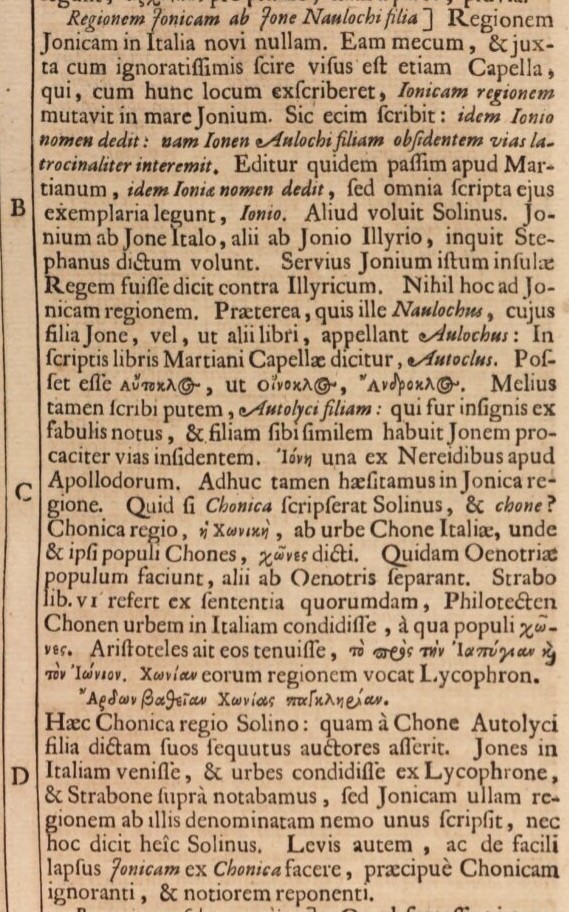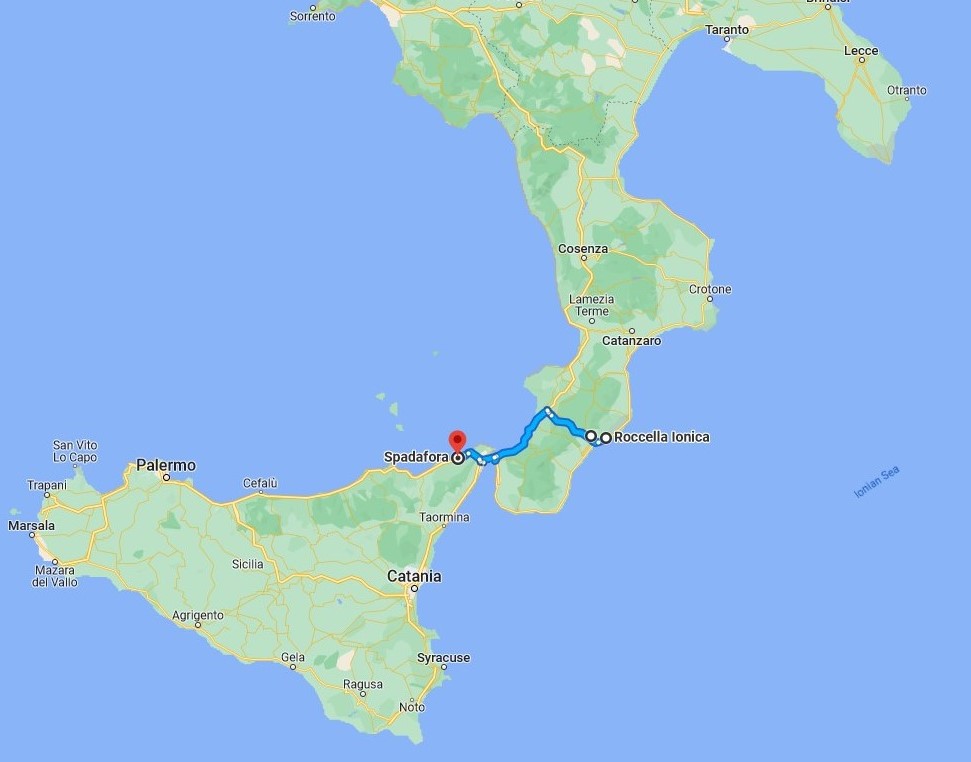In 1629, Claude de Saumaise, who also styled himself by a Latinised form of his name, as Claudius Salmasius, wrote a commentary on Solinus's Polyhistor text to which you are referring. He was just as puzzled as you are about this reference to an Ionian region of Italy, and so spends a good chunk of paragraph, dealing with the exact-same selection of text that you have highlighted in an attempt to explain it, in which he starts off by stating, simply, that, "I know of no Ionian region [regionem Ionicam] in Italy."
He then goes on to cite the African writer Martianus Capella "who, when he wrote this passage, changed 'the Ionian region [regionem Ionicam]' into 'the Ionian Sea [mare Ionium]'", apparently having thought along similar lines as yourself regarding possible meaningful solutions to the quandary.
From what de Saumaise goes on to say, however, he clearly thinks it to be a much bigger mistake than this:
Thus he writes: the same also gave Ionia its name, for he killed Ione, daughter of Aulochus, who was blocking the highways like a bandit. It
is indeed published here and there in Martianus, he gave the same
name to Ionia, but all his written copies read Ionio. Solinus
meant something else. Stephanus says that some want it to be called
"Ionian" from the Italian Ionius, others from the Illyrian Ionius. Servius says
that Ionius was king of the island opposite Illyria. This has nothing to do with the Ionian region.
Moreover, who is this Naulochus whose daughter was Ione, or, as
other books call him, Aulochus? In the written books of Martianus
Capella it is said Autoclus. It could be Αὕτοκλος, as Οἵνοκλος,
Ἄνδροκλος. However, I think it better written as the daughter
of Autolycus, the notorious thief known from fables, who
had a daughter similar to himself, Ione, impudently obstructing the roads. Ἰόνη was one of the Nereids according to Apollodorus.
Upon the Ionian region, however, still we hesitate. What if Solinus
had written Chonica, and chone? The Chonic region, ἡ Χωνικὴ, from
the city of Chone in Italy, whence the Chones themselves were called
χῶνες. Some make them a people of Oenotria, others separate them from the Oenotrians. Strabo, in Book VI, reports from the opinion of some, that
Philoctetes founded a city, Chone, in Italy, from which the people are
χῶνες. Aristotle says that they held sway over Iapygia and Ionia. Lycophron calls their country Χωνίαν...
This Chonic region, Solinus says, followed by his authorities, is named after Chone, the daughter of Autolycus. We noted above that
the Ionians came to Italy and founded cities according to Lycophron
and Strabo, but no one has written that any region was named Ionian by
them, nor does Solinus say this. However, it is easy to mistake and turn Chonica into Ionicam, especially for someone unfamiliar with Chonica and trying to make it more recognisable.
That is my own translation of de Saumaise's Latin text, excerpting the portion of his commentary relevant to your question, for the print publication of which, see below.

Abstracted from p. 42 of Vol. 1 of Plinianae Exercitationes in Caii Iulii Solini Polyhistora at the Bayerische Staatsbibliothek, obtained via the Münchener DigitalisierungsZentrum (MDZ) Digitale Bibliothek.
As de Saumaise notes, certain versions of the Polyhistor refer to Ione's father as Naulochus, rather than Aulochus, and he has his ingenious ideas, as above, for how to make sense of the otherwise completely obscure Aulochus.
Naulochus, however, is more intelligible to me as quite likely the eponym of the ancient city of the same name on Sicily's northeastern coast, famous for being the scene of a naval battle between Sextus Pompeius and Marcus Vipsanius Agrippa during the Roman civil war in the 30s BC leading up to Octavian (later Augustus Caesar) taking control of the Roman empire.
The Paris 1847 C.L.F. Panckoucke edition of the Polyhistor, which has Ione's father as Naulochus, entitles this section of the text "De Italia" ("About Italy"), so as you observe, indeed this regionem Ionicam contextually should be a place in Italy. De Saumaise's commentary appears to completely dismiss this as a possibility, whence his explanations that boil the matter down to scribal errors or such.
The closest I could arrive at an alternative position on this would be essentially that perhaps what is intended here is the coastline of Italy bounding the Ionian Sea, which is to say the "sole" of Italy's "boot." Calabria, the "toe" of Italy, abuts the corner of Sicily in which the city of Naulochus would have been located. At least two towns in the region, Gioiosa Ionica and Roccella Ionica, bear the idea in their names.

Supposedly ancient Naulochus was somewhere near what is now Spadafora.
The shores on this side of the country are referred to at present day as its costa ionica, "Ionian coast", but I don't know that this would have been a normal way to think of it in ancient times nor whether this would have been equivalent to regionem Ionicam.

